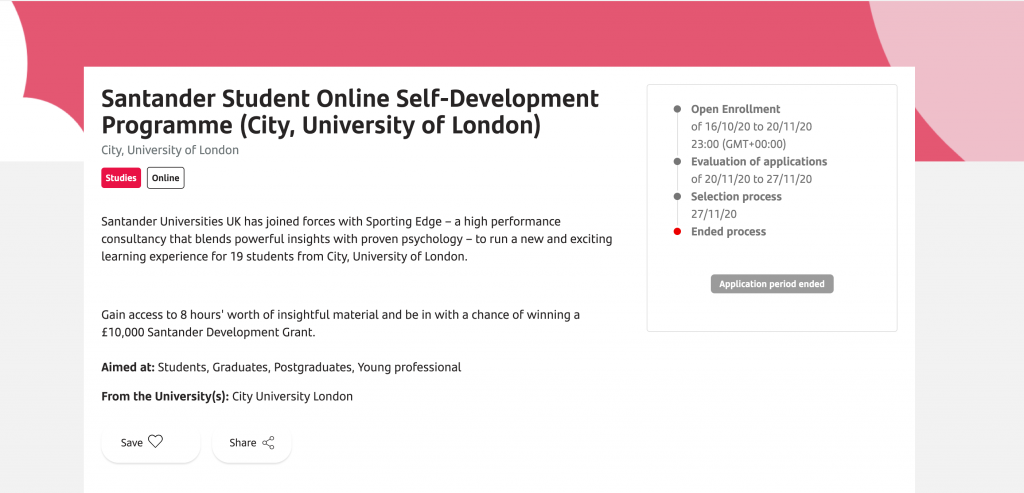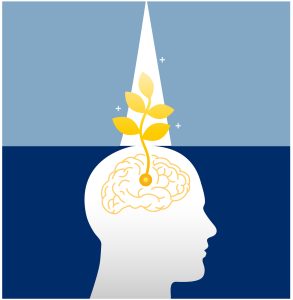What I Learnt From The Santander Online Self Development Programme…
I had the pleasure of taking part in the ‘Santander Self Development Programme’ in partnership with Sporting Edge. The program consisted of short video insights on a variety of helpful skills from professionals such as Professor Guy Claxton, Frank Lampard and James Kerr. The opportunity was open to just 19 students from City, University of London.

The programme helped me develop some important skills, useful both for University and for life afterwards. Here are the highlights…
The importance of a Growth Mindset:
A growth mindset is a mindset which keeps evolving and adapting to change. Professor Guy Claxon uses the metaphor of performance being like a muscle, the more you work on it the bigger it’ll grow. This means no matter what mistakes you make, or what you believe your capacity to achieve is, you should aim higher. James Kerr said you should ‘aim for the highest cloud because even if you fail, you’ll hit a lofty mountain’. This is important in your degree and in life. If you insist you cannot do something, you won’t do it. If you believe you can’t achieve that first grade, you’ll become complacent and not achieve it. As Carol Dwex said, instead of saying ‘I can’t do this’ you have to start thinking ‘I can’t do this yet’ and work on it until you can.
Focus:
In order to reach your full potential, mindfulness is so important. You need a ‘watertight’ compartment between your thoughts in order to achieve the best you can. If you are writing one essay, whilst planning another in your head, the one you’re writing won’t be your best work. As Boris Becker said:
‘too many ants in your head will stop you seeing what you need to succeed’.
Do not flood your mind with too much at once, write a list and focus on one issue at a time.
Wellbeing:
Making sure both your mind and body are happy is key to wellbeing. Whilst you are sleeping, your brain processes all the information you learnt that day. Therefore, if you fail to sleep the right amount of time or get the right type of sleep (deep sleep), your brain cannot process the information and your learning will be slowed down. Frank Lampard stated in his insight that when he was not playing a game, he wouldn’t even leave the sofa for hours. Downtime is important for wellbeing.
Confidence:
Eniola Aluko, before she would commentate on Match of the Day, would watch the football games ten times. Preparation is a fall back for nerves. John Coates stated the three things which create pressure are novelty, uncertainty and uncontrollability. When you feel out of control in a situation and unprepared, it makes it ten times harder to complete the task. If you are prepared, then confidence will shine through. This is important in all aspects of University, from essays to presentations to tutorials, being prepared will lead to better confidence and that will reflect in your work.
Don’t believe you are a finished product. Once you achieve your first and think ‘I’m the best I can be’ that’s when you become complacent and your work standard falters. Over confidence can be as damaging as under confidence.
Communication Skills:
People can communicate both with their body and their voice.
It’s important when speaking to give yourself the time to breath, think and then speak. By doing this you allow yourself to think about what you are saying and avoid the ‘ums’ and ‘ahs’. Additionally, Lisa Akesson emphasises how facts are important, but can become dry. It’s important to put real life into facts, such as telling stories. In interviews it’s a powerful tool to back up your skills and facts with real life stories that show your skills in action. James Kerr in his insight explained after an earthquake, people used film references to explain their experience, demonstrating how powerful stories can be.
Body communication is just as important as what you say. Amy Cuddy, a social scientist at Harvard, spoke on the importance of power poses. Sitting straight up with shoulders out and head held high actually increases testosterone levels which increases dominance.
Victim Triangle:
Doctor Stephen Karpman created the victim/drama triangle back in 1961. In this triangle there is the victim (yourself), the perpetrator (the reason for your stress) and the rescuer (the person who helps you). However, Karpman states the damaging effects of having the rescuer. The rescuer will keep you in victim mode, comforting you but not helping you overcome the stress. You must become your own rescuer and realize that the perpetrator is really the challenger, helping you to become better.
Thanks to Sienna Woodley for this piece on the Santander Self-Development Programme. Sienna is a first-year law student at City, University of London. She is currently a programme representative for LLB Law Year One and a first-year Law representative for City’s Law Society. She hopes to help current and future students with the skills she’s adopted in her time at university.




